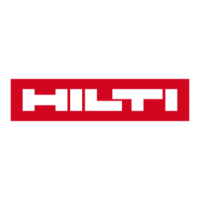9
en
11. Warranty
Hilti warrants that the tool supplied is free of defects in
material and workmanship. This warranty is valid so long
as the tool is operated and handled correctly, cleaned
and serviced properly and in accordance with the Hilti
Operating Instructions, all warranty claims are made
within 12 months from the date of the sale (invoice date),
and the technical system is maintained. This means that
only original Hilti consumables, components and spare
parts may be used in the tool. This warranty provides the
free-of-charge repair or replacement of defective parts
only. Parts requiring repair or replacement as a result of
normal wear and tear are not covered by this warranty.
Under no circumstances will Hilti be obligated for
direct, indirect, incidental or consequential damages,
losses or expenses in connection with, or by reason
of, the use of, or inability to use the tool for any pur-
pose. Hilti specifically excludes the implied warranties
of merchantability and fitness for a particular purpose.
For repair or replacement, send tool and/or related parts
immediately upon discovery of the defect to the address
of the local Hilti marketing organization provided.
This constitutes Hilti’s entire obligation with regard to
warranty and supersedes all prior or contemporaneous
comments and oral or written agreements concerning
warranties.
12. Disposal
Most of the materials from which Hilti power tools are manufactured can be recycled. The materials must be cor-
rectly separated before they can be recycled. In many countries, Hilti has already made arrangements for taking
back your old electric tools for recycling. Please ask your Hilti customer service department or Hilti sales repre-
sentative for further information. Should you wish to return the electric tool yourself to a disposal facility for recy-
cling, proceed as follows: Dismantle the tool as far as possible without the need for special tools. Use absorbent
paper to wipe greasy parts clean and collect any grease that runs out. This paper should also be disposed of cor-
rectly. On no account should grease be allowed to enter the waste water system or find its way into the ground.
Separate the individual parts as follows:
Part / assembly Main material Recycling
Toolbox Plastic Plastics recycling
Outer casing Plastic / synthetic rubber Plastics recycling
Electronic switch Various Electronics scrap
Motor Steel, copper Scrap metal
Gearing parts Steel Scrap metal
Battery Nickel-cadmium **
Nickel-metal hydride
Screws, small parts Steel Scrap metal
* Return waste material for recycling.
** Dispose of the battery in accordance with national regulations or return used
* ** batteries to Hilti for recycling.
Disposal
Batteries
The Hilti B24/2.0 NiCd and B24/2.4 NiCd battery has 20 nickel-cadmium cells.
The Hilti B24/3.0 NiMH battery has 20 nickel-metal hydrid cells.
Both you and Hilti bear the responsibility for recycling of the worn-out batteries in
keeping with environmental protection requirements.
Important: Do not throw worn-out batteries into household waste, a fire or water.
Dispose of the batteries in accordance with national regulations or return them to
Hilti.

